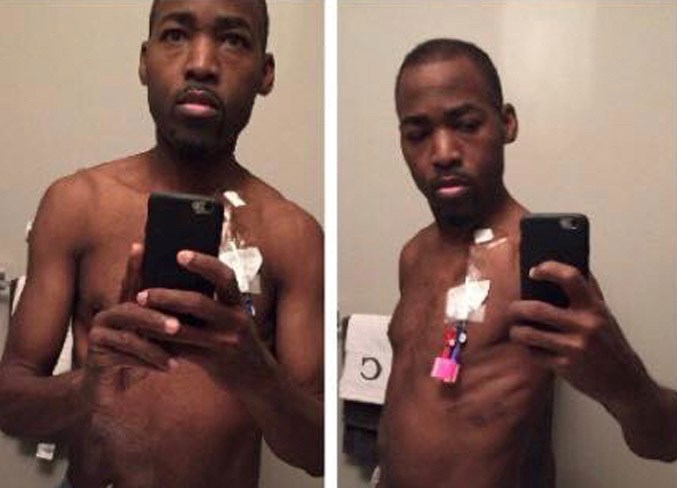Chris Charles isn’t kidding when he says he needs a new kidney. Finding a matching organ donor is his only way out of a long series of health battles that took over his life three years ago.
“Getting used to all of this was very hard,” Charles said, talking about the dialysis, the cocktails of drugs, the weight loss, the lack of energy, the gastric ulcer, the mood swings, and more.
The 44-year-old graphic designer has had diabetes since he was a teenager, a likely reason his kidneys have been “pretty low” his whole life. It didn’t really bother him until January 2016, when he started dropping some weight. And then some more. In fact, he didn’t stop, losing approximately 20 pounds before the summer and finding his energy had bottomed out, too.
That turned out to be sarcoidosis, just the first of a series of attacks on his overall health.
“The first couple of weeks I was just so sick. I was having a hard time staying focused and keeping my mind on things. Then I had a gastric ulcer.”
Charles came home one day feeling dizzy to the point of passing out. He couldn’t even walk down the hallway of his apartment building. It really freaked him out, he said. It must have freaked out his fiancée, too, when he stopped breathing and he vomited up a lot of blood.
“I woke up to a bunch of paramedics and I went to the hospital. The next day, they basically told me that your kidneys are done and you’re going to have to go on dialysis today,” he recalled.
“I realized that this is it: life from here is going to be absolutely different.”
Medical staff inserted a catheter into his chest and the dialysis treatments began. His heart pumps blood to the dialysis machine where waste is removed from the blood before the machine pumps it back in. He still gets these treatments a few times each week at a few hours each time.
“I would not wish this upon my worst enemy to ever have to do dialysis at the hospital,” Charles said.
Thankfully, there’s a portable dialysis machine that he can use at home. That’s combined with a series of medications he takes morning, noon and night. They helped control his pain, his blood pressure, the electrolytes in his blood, and his diabetes. He has had bad reactions to a lot of those drugs, he said, including one that scarred his face.
He’s had fluid in his lungs requiring surgery. His weight loss took him down more than 50 pounds in total.
At least he has since gained some weight back. His ‘Before and After’ pictures tell the bigger story though: he doesn’t really look the same at all. His only viable option is a kidney transplant, and he worries that it could take several years, if it happens at all. All that dialysis does not appeal to him, but he has no choice.
Making matches
Manuel Escoto is one of the lucky ones and he has his mother to thank for giving him life twice. A congenital defect caused his kidneys to fail when he was 19.
“I was on dialysis for 21 months and if you’ve even spoken with anybody else on dialysis, it's not fun,” he said. “You really do feel like a prisoner: that’s your life. When you’re not in dialysis, you’re recovering from dialysis.
“In terms of receiving a kidney, it opens up freedom … to pursue other ventures: travel, education, work. It gives you a lot of options that you didn’t have before.”
Escoto, 31, said he feels lucky to have been a young man when he had to undergo his dialysis. It was heartbreaking for him to see seniors struggling with their treatments at the clinic.
In Alberta, the median time to receive a transplant is four years, though some do wait eight years or even more. We have a long way to go to improve our rates of organ donation. As of 2017, Canada ranked 18th in the world while Alberta has the third lowest rate in the country. Ontario is No. 1.
Thankfully, a kidney can be donated by a living donor, just like the one Escoto got from his mother. She’s doing just fine, too. After her procedure, she spent four days in the hospital and was off work for about four weeks.
The most recent information from Dec. 31, 2017, showed 640 people waiting for any organ donation while the number of people who have signed up to be donors is in the area of 120,000 since the time the province made an online registry available in 2014, he said.
While Chris Charles waits, he has taken to social media to encourage others to save his life. On Facebook, he posted about his need for a living kidney donor, one who matches his O+ blood type. People who are interested, he wrote, should call 780-407-8698 ext. 3 to start the testing process.
The process is fairly easy to start and the Kidney Foundation’s website (found at www.kidney.ca) can walk you through the steps. You can register via the online portal on MyAlberta or MyHealthAlberta, or when you're renewing your driver’s licence or car registration. That’s only the introduction, however. Being a living donor is “quite a rigorous process” starting with blood work through the Northern Alberta Renal Program. The entire process can take up to a year.
“They test everything from your physical fitness and you sit down with a psychologist. There’s that to offset the fear that people might feel pressured or they’re doing it for the wrong reasons.”
People who wish to become organ donors should talk to their family and friends about it as well. Escoto meets a lot of donors through his work at the Kidney Foundation and they all have something in common.
“I’ve never encountered anybody that has regretted doing it.”




